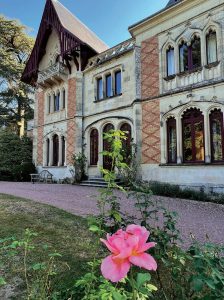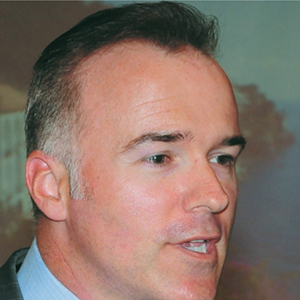
FRONT OF THE ROOM – Brian Lange
Can a France trip teach us to be better trainers? Oui!
 Recently, my wife Lori and I took a fantastic 16-day trip to France. We traveled with two other couples for most of the trip, including a full week together at a beautiful chateau in La Roche Posay in the Loire Valley.
Recently, my wife Lori and I took a fantastic 16-day trip to France. We traveled with two other couples for most of the trip, including a full week together at a beautiful chateau in La Roche Posay in the Loire Valley.
Traveling with others sometimes can lead to disagreement, frustration, irritation and so much more. It occurred to me that working on a training team has similar potential.
I’ve been thinking more about those parallels. What made our trip work so well? And what were the potential lessons about being a good teammate on a training team?
Lead or Follow: Choose Your Role
While using the metro to switch train stations in Paris, the six of us quickly became confused and anxiety rose as we feared missing our next train. One of our crew, Chris, stepped up and led the charge by attempting to speak with appropriate staff and trying to decipher the maps and destinations.
Despite my own navigation experience, I realized that my weighing-in (and that of others) could create additional confusion and increase tension. So, I appreciated that Chris was stepping up, and I (we) submitted to his leadership. Yes, we started down some wrong paths, but the goal was to make the final train — and we accomplished it (thanks, Chris!).
Willingness to follow can be as effective as willingness to lead. When I am co-facilitating with one of my work teammates — and I’m not the primary facilitator at the moment — I switch to complete support mode. How can I help serve my colleague so they can do their best work?
Sometimes that’s as simple as getting some water, closing a door to reduce noise or volunteering to capture class ideas on a chart pad. Role clarity can positively impact results.
Believe Solutions Are Possible
Upon arrival at our destination train station, our scheduled van for six passengers and 12 pieces of luggage turned out to be a small Volkswagen crossover SUV! Initially, we felt sunk (with no other apparent options as it was off-hours), but we rallied and figured out a seating plan.
We stacked luggage strategically throughout the vehicle, and had folks sacrifice personal comfort for the greater good. We made it to the chateau and achieved our second main goal of the journey.
In training, we often face similar “challenges.” Recently, the audiovisual at a hotel meeting site wasn’t working, and a breakout room was too small for our needs. Part of the responsibility of being at “the front of the room” is that we have to roll with these problems and find solutions — quickly!
Anticipate Needs of Others
As a result of a late-season heat wave, we ended up making daily late afternoon use of the pool on the property. On more than one occasion, I saw members of the group go back up to the chateau and return with items they thought others might need or appreciate.
I’m talking about specific, thoughtful items related to helping out with minor health issues, sun protection and even personal preferences on refreshment/food items. The appreciation and goodwill these acts created to the overall engagement and enjoyment of being a part of the traveling crew.
We can find similar opportunities to help out our training colleagues – and that discretionary effort can pay big dividends in team cohesiveness and performance.
Seek Inclusion
One member of our group felt his skills in an outdoor game were not up to his standards, so he wanted to skip out on the camaraderie of the activity. The other two travelers involved sought to assure him that his involvement was keenly desired and ensured a safe environment for his participation. He joined in, and the group absolutely benefited from his involvement.
Have you seen something similar in a class or around the office? What are we doing to help new team members and learners feel they truly belong?
Personal Sacrifice Can Benefit Others
On a bike outing, an experienced and conscientious member of the crew purposely selected an older, heavier bike and had the least capable rider enjoy the lighter, newer bicycle. This self sacrifice for the benefit of another added immensely to a sense of “team” and engendered an even stronger desire to be “of service” toothers.
What opportunities exist for us to sacrifice for our training colleagues? Have I volunteered to tackle delivering the “dry” material (and hopefully “re-working” it!)? Have I taken on the late afternoon time slot? Have I attempted to go back through the promotion review committee to get slides changed for easier learner consumption?
Bringing It Home
In the end, everyone’s apparent desire to be the best traveling teammate they could be on our trip is what contributed to such a remarkable experience. I am committed to remembering these lessons and applying them even more concretely with my own work teammates.
That should help enhance everyone’s experience at the front of the room.
 Brian Lange is with Perim Consulting and serves as lead facilitator for LTEN PrimeTime! For Trainers Core and Masters Workshops. Email Brian at blange@perim.com or connect with him on LinkedIn at www.linkedin.com/in/brianplange.
Brian Lange is with Perim Consulting and serves as lead facilitator for LTEN PrimeTime! For Trainers Core and Masters Workshops. Email Brian at blange@perim.com or connect with him on LinkedIn at www.linkedin.com/in/brianplange.








